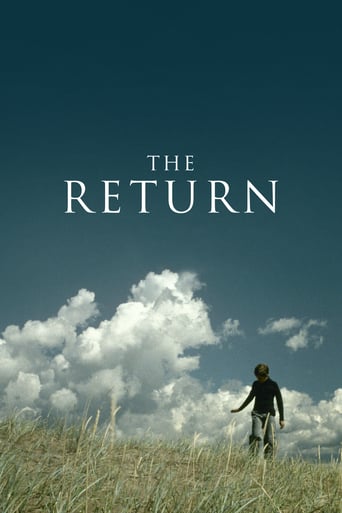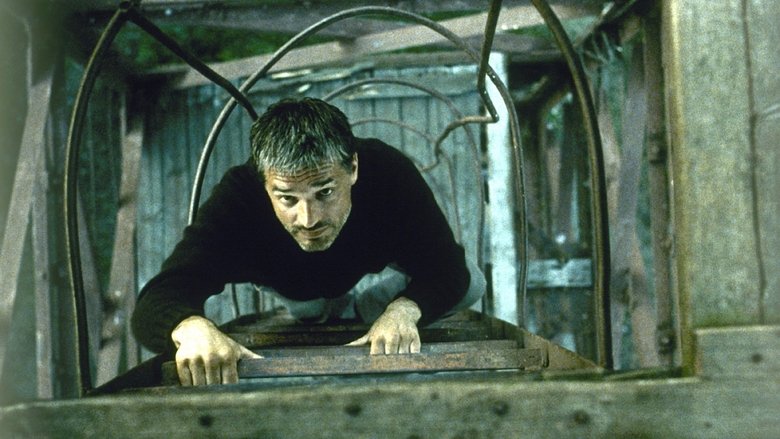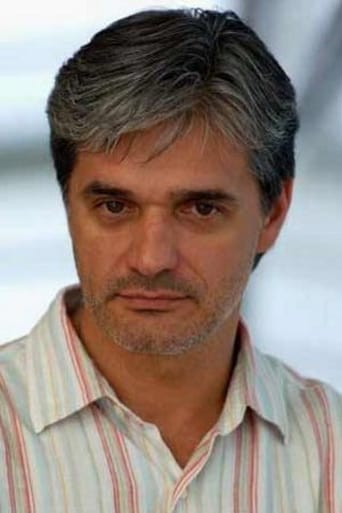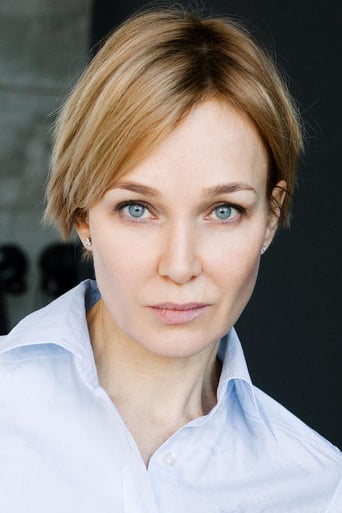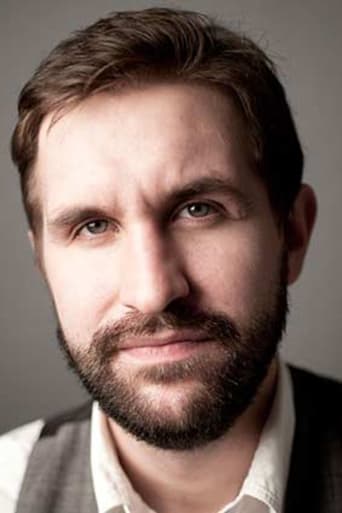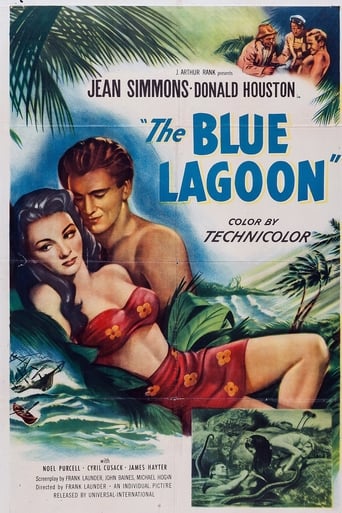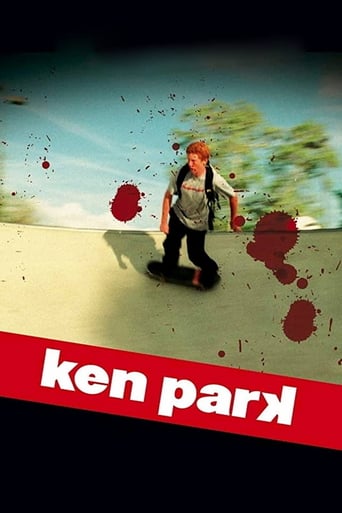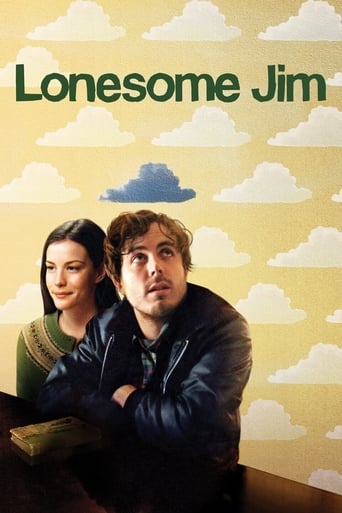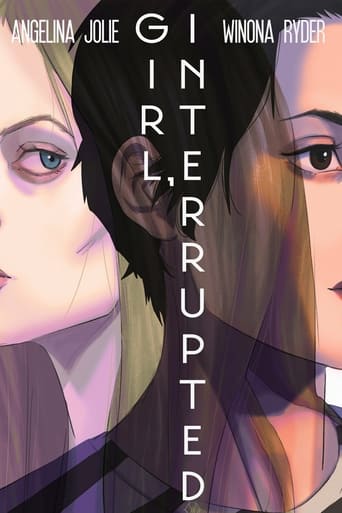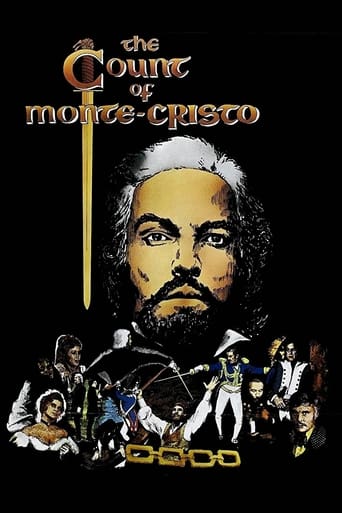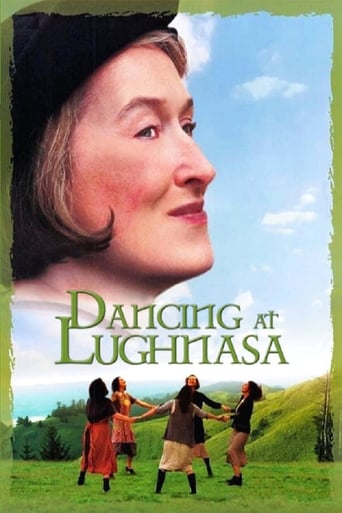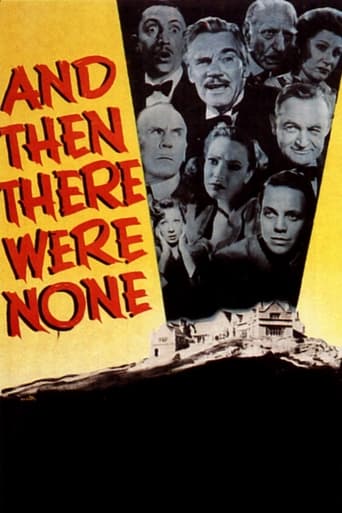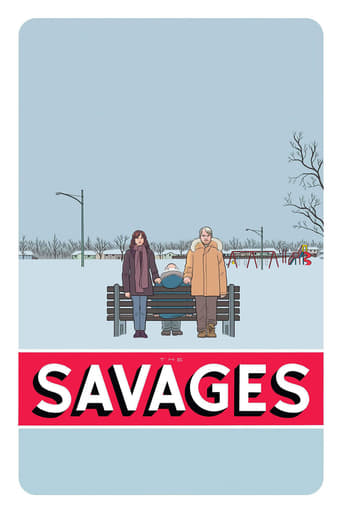The Return (2003)
The relationships among two pre-pubescent brothers and their estranged father are tested on a trip into the Russian wilderness.
Watch Trailer
Cast


Similar titles
Reviews
Beautiful, moving film.
A lot more amusing than I thought it would be.
In truth, there is barely enough story here to make a film.
A story that's too fascinating to pass by...
It's got an enchantingly beautiful cinematography, it's unassuming, it's kafkaesque.It's tricky to delve into the film past its face value, because that way, you might realize it's trying to tell you a whole different story. I, for one, took it more literally because I didn't think I could place the subtext appropriately. After digging up one in-depth analysis or two, that turned out to be a good call: the movie is apparently an allegory about Russia the motherland (wouldn't have guessed that in a lifetime!), folkloric identity, old vs new ideology and all. Bearing that concept in mind, the meaning of the movie expands consequentially. But supposing we're using my initial understanding, I thought it was about a journey of self-redifinition. The filmmakers said it themselves, it's a visual journal.Every interaction feels so organic. They don't even bother to try and overdo it. Zero amount of bullshit sappy/cliché moments. The brothers go back and forth—sometimes simultaneously—between fiery bickering and having each other's back. The father is an unsympathetic enigma.I like it. It's good. It can be too outlandish for my personal taste at times is all. Especially prior to knowing about its root analogy. 7/10.P.S.: RIP Vladimir Garin, died at 16, shortly before the world premiere of this movie.
(NOTE: I read reviews here after viewing, and comments in the 'The Return does not have a full-filling end' thread, and left a couple of my own. This review builds on those, and observations made by hilaryjrp and bostonfilmfan).What life is all about, a haunting movie I won't soon forget. So riveting (with very little dialogue) I hardly noticed the subtitles. The action speaks for itself. It's highly suspenseful, and you haven't the faintest idea what's going to happen, yet also full of simple, quiet moments that bespeak volumes (AND mysteries) about the characters.The film is lyrical, poetic, almost subliminal, rather than "expository" (i.e., the payoff being in the journey, rather than the ultimate ending). Actually, lyricism and exposition are so expertly intertwined the film succeeds on BOTH levels. But be forewarned, it has disturbing events, it's no walk in the park- if you're a sensitive person that can't tolerate tragic or traumatic themes, this may not be your cup of tea. But I thought the ending was absolutely seminal to the experience- for both the characters and the VIEWER.This is the kind of movie rife with multiple possible meanings and interpretations, which invites repeat viewing. Moreover, you learn something about yourself in your reactions to what unfolds- what you pay attention to, expect, hope for... fear.***BIG SPOILERS FOLLOW AS PLOT, THEMES AND THE ENDING*** DON'T read further until you've seen the film if, like me you're the kind of person who thrives on discovery and surprise. Reading others' interpretations in advance will color your own, of course.In reviews and comments, some viewers decried the ending- some found it disturbing, others thought it, at the very least, unsatisfying. No, the film does not have a "satisfying" ending (seemingly, anyway, though perhaps there's a kind of symmetry to it), that was the POINT (art imitating life), I thought. The boys learn a terrible lesson. Wherever Dad had been, whether he was a nice guy or not, whether he intended to stick around, whether he planned to make up for lost time, whether they'd resolve issues and forge a relationship- as troubling as those dangling threads (symbolized by the mysterious contents of the box) may have been- they were infinitely better than what actually occurred. (Or WERE they??) Bring down the curtain on EVERYTHING where Dad is concerned. What a shock. Whether they had dreamed of reunion, hated his guts, been crushed by his desertion, yearned for him, whatever, there would now NEVER be a "satisfying ending", no-one would ever find out what the box contained.BUT, there was ALSO the theme of the younger boy's fear of life, of many things. He cried and told his mother at the beginning if she hadn't come he would've died. He threatens to kill himself by jumping off the tower- then, he sees death up close, for real, he's even partly responsible. Crash course in what death REALLY means. What an enigmatic film- note the pics/selfies of the brothers on the trip home (interspersed with the credits- STAY TUNED)- in some they're laughing, now seem lighter (dealt with something unspeakable, faced it with courage, were transformed by the experience? Both brothers change over the course of the film). Perhaps they're now FREE of the spectre of their father's desertion, and all the issues related thereto that have been hanging over their heads for 12 years (achieving a kind of closure). So perhaps the question is, did death represent being cheated of answers and what might have been, OR did it precipitate closure (albeit in a traumatic, kick-in-the-gut fashion)? Could BOTH be true? (Regret over what might have been and the need for closure are both integral parts of the grieving process.) One might even wonder if, all things considered, if Dad or "fate" or God didn't give the boys a gift- the ultimate sacrifice, so that they might begin life anew.In a nutshell, I think The Return is disconcerting because you think at its core it's about a relationship but it's actually about death and its ramifications. In I NEVER SANG FOR MY FATHER Gene Hackman said "Death ends a life, but it doesn't end a relationship." Or does it? Thematically and mood-wise this film reminded me a lot of a favorite film, Hayao Miyazaki's SPIRITED AWAT- at the beginning Chihiro, too, is negative, whiny and pretty much afraid of everything. While she doesn't face anything quite this bad, her parents will live or die as a result of her actions.And finally, the two brothers solidified their relationship on the trip, bonding as never before. Each became protective of the other when the father was unreasonable or harsh- at different points each threatened to kill him if he hurt the other. At the end the older boy assumed responsibility, never chiding his brother for what he had done, assuming the role of protective big brother or perhaps even "father". Contrast this with the way he treated his little brother at the beginning of the film.However one interprets the film, it appeared that both boys were honed, improved by events, and became closer (in this regard, in many ways, it reminds me of ORDINARY PEOPLE, which involves a death in the family and two people bonding at the expense of a third). LOTS to chew on in The Return! Highly affecting, and though harrowing at times, I thought it was wonderful, brilliant- a work of art.
Zvyaginstev treats film making following Tarkovsky like Brahms and Mendelssohn composed music after Beethoven. Tarkovsky's shadow proved to extend too far for Zvyaginstev to escape. However, the way Zvyaginstev handles this sense of dominance is extremely tasteful. The references to Tarkovsky are scattered with the perfect amount of variation from the original. By referencing the great Russian film maker, he ran the risk of only imitation. However, the takes on motifs like Christianity and water are put forth in such a way that they seem like extensions and not imitations. Where the piece varies, the young film maker is actually critiquing his predecessor. For instance, Tarkovsky's marked open-endedness is challenged by "The Return," which has a much tighter story line. Brahms did the same thing when he quoted the exact same hymn used in Beethoven's 9th symphony in his 1st symphony, but restricted the symphonic form to an instrumental genre where Beethoven opened it up to a mixture of instrumental and vocal music.
When I returned the DVD (yes, RETURNED THE DVD -- a whole 'nother story), I told the inquiring clerk that I had, indeed, enjoyed the movie. That, in fact, I couldn't think of anything wrong with it.Which maybe didn't sound quite like the ringing endorsement I meant it to be. "The Return" is, at once, not complicated and emotionally complex. Powerful without flexing. You can fit the plot into the palm of your hand, but filling in the spaces would take longer than watching the thing. So I've just been telling anyone who'll listen to see it. And if that ain't a ringing endorsement... The two young actors steering the ship - Vladimir Garin and Ivan Dobronravov - are great. Made me think of Keisha Castle-Hughes' go in "Whale Rider," which went out to the world the following year, I think. These young actors were believable, and so clear in their motivations without ever seeming unnatural. And they were beautiful, from their zits to their table manners. I loved watching them.(And I hated reading that Garin drowned just after filming when he leapt from the same tower the boys do in the first scene of the film. A weird, weird tragedy, just hauntingly absurd.)And then there's the film's use of nature, who is so present - so foreboding and lovely - that she would deserve subtitles if the look of her didn't speak for itself. I don't know that I've seen a film capture the natural world quite so effectively, so quietly and profoundly. Never was there a trumpet blast to announce: This is beautiful! But never did a flock of birds or some shifting willows on a screen captivate me so, never did a placid body of water weigh so much. Don't know how many of my peeps I can convince to watch a darn-near perfect, subtitled Russian flick, but I'm trying to tell them.

